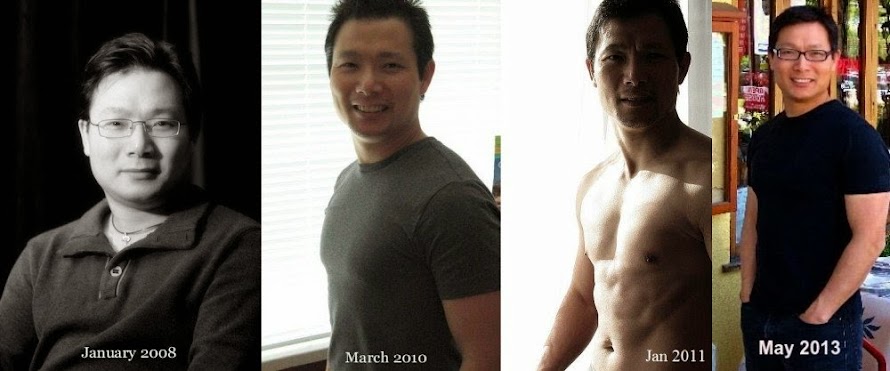Translate This Page:
Monday, May 30, 2011
Exercise Peaks
My two main forms of exercise are boxing\kickboxing and road cycling. I have a fleet of bikes ranging from a fixed gear to ultra-portable folding bikes.
The conditioning warm ups for boxing consist of bodyweight exercises such as various kinds of push ups, squats, burpees, skipping, jumping and station exercises. Then we usually work drills for 3 minutes ending with an all out sprint punching or kicking for under a minute.
If we chart our weekly physical activity levels, the average person does not have much peak activity at all. I define peak activity as reaching 90% of Maximum Heart Rate for a brief period of time. In my case, I am 44 years old. Therefore, my Max HR is 220 - 44 = 176 beats per minute. 90% of that is 158 bpm. That's an exercise peak for me. I program in several exercise peaks during the week so my physical activity chart will show long periods of relatively low level energy expenditure with periods of moderate exercise (cruising on a bicycle but not sweating) and peaks of maximum effort.
How about a fast and efficient way to hit some peak exercise? Checkout the link by Conditioning Research here: http://conditioningresearch.blogspot.com/2011/05/single-best-exercise.html
Tuesday, May 10, 2011
A Little Bit At A Time (aka how we put on weight)
Don Matesz over at Primal Wisdom did a great job of tearing apart some myths about obesity which I agree with. He first wrote this piece about Venus figurines then followed it up with another post showing how a seemingly trivial amount of excess calories per day can lead to obesity over time.
Pop quiz:
Why does a person eating a low fat diet put on weight?
Why does a vegetarian who eats no meat and no animal fat put on weight?
Why does a person on a primal\paleo caveman diet put on weight?
How does (insert name and relation of person here) eat sweets and dessert but don't seem to pack on the pounds?
Lets leave aside discussion about food groups and optimal nutrition for a moment. The answer to the questions above is the same in all instances. If you take in more calories than you expend, you will put on weight.
We live in an age where access to food is easy. In particular, sugar, wheat and starch are easy to come by at a relatively low price. The double whammy is we are also much less physically active than humans just a few centuries ago. The advent of industrialized farming, agri-business conglomerates, big box stores selling warehouse surpluses of non-perishable food and the growth of fast food restaurant chains have made access to processed foods far too easy. With less physical activity and the irresponsible use of electronic entertainment, this is the perfect storm for obesity and sedentary diseases.
The remedy? Eat less, move more. Your body and your brain will thank you for it.
How to start?
First, check your Body Mass Index by plugging in the numbers on this calculator:
http://www.nhlbisupport.com/bmi/
The BMI is only a yardstick not the be all and end all of body metrics.
Next, if your BMI indicates you could lose some weight, decide on a strategy. The one I recommend is a combination of diet modification and exercise. Bear in mind however that 80% of body composition is diet and only 20% is due to exercise. So if you're really paying attention, you'll understand that what you eat in more important than how you exercise.
I recommend the Paleo Diet because it has worked for me. Strangely, once you lose the weight you wish to lose, it is possible to deviate from the Paleo diet and still keep the weight off. At least in my N=1 case, this holds true for me. The Paleo Diet along with a renewed focus on exercise has rebalanced my body.
Another issue I have observed is that some people engage in unhealthy eating due to underlying issues of grief, rejection, poor self-image or depression. No amount of exercise will cure this. No amount of short term diet changes will change this either. These underlying issues need to be dealt with for permanent, lasting changes to take place.
One can be slim eating a diet heavy in carbs, protein or fat. And if you've read this far, I'm not even dogmatic about which food group you should emphasize in your diet. The main thing in weight management is controlling your food intake and increasing your activity levels.
I just think we should move more during the week and engage exercises which make our hearts race and our muscles tire. We should jump, sprint, cycle, dance, perform weight resistance workouts (my favorite kind are bodyweight exercises), punch, kick and leap. These are functional, require speed, balance and agility to perform. We should sweat. If you can still talk while perform an exercise which you consider difficult, then you're not trying hard enough. Increase the workload until you're gasping.
Victor
Subscribe to:
Posts (Atom)


